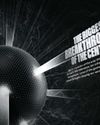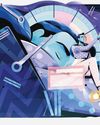
ARE WE REALLY IN AN INTIMACY FAMINE?
It sounds dire, but potentially, yes. Many of us are not going to work in the offices that provided us with exposure to people with whom we shared social, emotional and intellectual intimacy. We are not even smiling at people, because our smiles are disguised by masks [due to the pandemic]. The smile that we give another human could be a type of emotional intimacy for them, or a connection to a world that is happy and good, where people are supportive of each other.
When we get home, our children, our partners, whoever is at our house, might be threats to us. We have something called the behavioral immune system, which was studied before the pandemic, that says our bodies have a natural tendency to avoid potential pathogens. If we think someone is sick, we physically back away from them. It’s basically a turnoff when we know someone could be a threat to our physical wellbeing.
Prior to the pandemic, studies pointed to changes in our intimacy levels. A 2019 study I worked on with family scientist Brandon McDaniel found that 72 percent of couples felt a ‘technoference’ in their relationship.
Millions of people are lonely worldwide – one study reports prevalence rates of one in every five adults in the US and the UK, and one in ten in Japan – and loneliness has a profound, negative effect on mental and physical health.
Are we in an intimacy famine? I think so. We are at a place where it is harder to have intimacy than ever before.
DOES THIS MEAN THAT AROUND THE GLOBE, HUMANS ARE BECOMING LESS INTIMATE?
There are trends that point to the idea that we are not bonding in ways that maybe I would have considered bonding 30 years ago.
Esta historia es de la edición February 2022 de BBC Science Focus.
Comience su prueba gratuita de Magzter GOLD de 7 días para acceder a miles de historias premium seleccionadas y a más de 9,000 revistas y periódicos.
Ya eres suscriptor ? Conectar
Esta historia es de la edición February 2022 de BBC Science Focus.
Comience su prueba gratuita de Magzter GOLD de 7 días para acceder a miles de historias premium seleccionadas y a más de 9,000 revistas y periódicos.
Ya eres suscriptor? Conectar

THE WORST IDEAS OF THE 21ST CENTURY
NOT ALL IDEAS CAN BE HITS. ALONGSIDE GROUND-BREAKING INNOVATIONS, 21ST-CENTURY SCIENTISTS HAVE HELMED THEIR SHARE OF WILD TECH FLOPS, DUBIOUS THEORIES AND OVERHYPED BREAKTHROUGHS. HERE ARE THE BIGGEST TO FORGET

10 IDEAS THAT WILL SHAPE YOUR NEXT 25 YEARS
Predicting the future is considered a fool's game. But it's one many of us like to play.

THE BIGGEST BREAKTHROUGHS OF THE CENTURY
We're a quarter of the way into the new century. To mark this milestone, we asked the UK's top minds to highlight some of the game-changing scientific breakthroughs shaping our world since the year 2000

DO THE SCIENCE COGNITIVE SHUFFLE
Trouble sleeping? A lot on your mind? Use this trick and sedate your synapses

WHAT DETERMINES HOW MANY ABS I CAN GET?
Assuming you're a human being, you have exactly the same number of abs as everybody else: two.

HOW CAN I IDENTIFY MY PSYCHOLOGICAL BLIND SPOT?
In the 1950s two American psychologists, Joseph Luft and Harrington Ingham, proposed a way of thinking about psychological blind spots - things you don't know about yourself - that they called the 'Johari Window' (the term is a combination of their first names).

How can I change my personality?
Want to become more confident, extroverted or assertive? Science shows that with a few simple changes, you can unlock your best self

Could your cosmetics be harming your health?
Cosmetic companies are phasing out microplastics and so-called 'forever chemicals' to help protect consumers.

extraterrestrial US Congress is talking about activity again. Is the truth really out there?
Despite several testimonies, the question remains frustratingly unanswered

Map of 100 million human body cells revealed
Over three dozen new studies mark significant milestone towards complete Human Cell Atlas